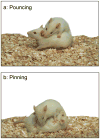The pleasures of play: pharmacological insights into social reward mechanisms
- PMID: 20684996
- PMCID: PMC2946511
- DOI: 10.1016/j.tips.2010.06.008
The pleasures of play: pharmacological insights into social reward mechanisms
Abstract
Like human children, most young mammals devote a significant amount of time and energy playing together, and social play is fun. Although social play is very pleasurable, it is more than just a frivolous activity: it is crucial for the development of behavioral flexibility, the acquisition of social and cognitive competence, and the maintenance of group cohesion. Social play is a natural reinforcer, and the neurotransmitter systems intimately implicated in the motivational, pleasurable and cognitive aspects of natural and drug rewards, such as opioids, endocannabinoids, dopamine and norepinephrine, play an important modulatory role in the performance of social play. In this review, we address the notion that social play is rewarding, and discuss recent developments in the neuropharmacology of this behavior. This provides a framework to understand how the brain processes social emotions, to make young individuals enjoy social play.
Figures
References
-
- Panksepp J, et al. The psychobiology of play: theoretical and methodological perspectives. Neurosci Biobehav Rev. 1984;8 (4):465–492. - PubMed
-
- Vanderschuren LJMJ, et al. The neurobiology of social play behavior in rats. Neurosci Biobehav Rev. 1997;21 (3):309–326. - PubMed
-
- Pellis SM, Pellis V. The playful brain : venturing to the limits of neuroscience. Oneworld Publications; Oxford: 2009.
-
- Jordan R. Social play and autistic spectrum disorders: a perspective on theory, implications and educational approaches. Autism. 2003;7 (4):347–360. - PubMed
-
- Alessandri SM. Attention, play, and social behavior in ADHD preschoolers. J Abnorm Child Psychol. 1992;20 (3):289–302. - PubMed
Publication types
MeSH terms
Substances
Grants and funding
LinkOut - more resources
Full Text Sources


